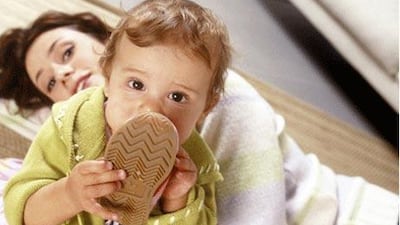Every time I touch the liquid soap dispenser in the kitchen, it triggers a sequence of images in my head along with the germ-killing ooze in my hand. They're from an advertisement on television. A child and his mother go to meet his father at work. He is a doctor and he comes out to see them. He is wearing a suit and looks very smart. He reaches out to touch his son, but the child's mother stops him. "With your hands?" she says. He smiles and pulls out a bottle of Lifebuoy - the brand of soap on my kitchen sink. The mother looks relieved and the family begin to make contact without the prospect of contagion.
The advertisement is a modern gothic horror tale. It plays on fears of deadly bacteria. It puts invisible creepy-crawlies between every handshake and lethal phantoms in every embrace. And it enlists modern medicine - the father is a doctor after all - to support this hygienic obsession. It reeks of neurosis. It stinks of paranoia. It is marketing at its most effective and its most odious. In many parts of the world, hygiene has become detached from the senses. Bad things no longer necessarily smell bad or look foul. Faculties of sight, smell, taste and touch do not count for everything in this realm. Purity is no longer naturally discernible. Only disinfectants, bleaches, alcohol wipes, lemon scents and Dettol aromas mark out territory as clean and acceptable.
Don't get me wrong. I'm not advocating dirt for dirt's sake. I'm not suggesting we wallow in filth. But it is good to remember that fungus and bacteria can be vital and pleasure-giving as well as noxious: yoghurt, cheese and bread would all vanish after an indiscriminate microbe cull. Astrid likes to chew shoes. She is particularly attracted to sandals and flip flops. She hones in on secluded pairs and sinks her teeth in to their grubby rubber soles. She enjoys chewing them, but obviously chewing shoes is not good for all sorts of reasons. We try to stop her, but it is harder than you might think. Often she is found quietly gnawing on some odd piece of footwear we thought we had put away.
A few weeks ago we came across what we thought was the perfect solution: hotel slippers. All the pleasure of a shoe, but without the muck and dust. We scattered them around our apartment, lures for the shoe-seeking jaws. The result? Tragically, the decoys were not popular. They remained unchewed. McNeil Healthcare, the manufacturer of Tylenol, began a huge product recall last Friday due to a bad smell from batches of over 20 medicines, including Tylenol, Motrin and St Joseph's aspirin. The Food and Drug Administration in the US received around 70 complaints, some from people suffering from nausea, vomiting and diarrhoea.
The noxious smell was caused by a chemical used to treat wooden pallets, the company said. Around 60 million items were included in the directive and the UAE was among the countries on the list. Brand recognition plays such a big part in choosing medication for children. While I buy generic, plain-label drugs for myself, I reach for a familiar brand for Astrid. Paying more money somehow gives me more confidence in the product, especially when it is neatly packaged and includes a long list of ingredients and side effects.
Yet as any savvy consumer knows, the link between the cost of an item and its quality is not always straight or easily navigable. This fiasco simply highlights that drug companies are businesses like any other and, like any other business, they are ultimately driven by profit. * Robert Carroll

